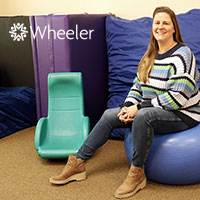Inspiring Hope, Changing Lives: Perspectives from Wheeler’s Occupational Therapist, Adrianne Smith

What do glitter jars and classical music have to do with occupational therapy? As it turns out, quite a bit. This is according to Adrianne Smith, Wheeler’s Northwest Village School (NVS) occupational therapist who has served students for 22 years after graduating from the University of New Hampshire. Working collaboratively with a team of transdisciplinary professionals, including teachers, clinicians, speech therapists, and more, Adrianne develops traditional and out-of-the-box strategies to help students perform necessary tasks throughout their school day and beyond. An alto singer and natural athlete, Adrianne's work creatively weaves in elements of music, art, performance, sports, and more.
What is Occupational Therapy?
Occupational Therapy uses everyday life activities (occupations) to promote health, well-being, and the ability to participate in the important activities in life. This includes any meaningful activity that a person wants to accomplish, from taking care of themselves and their families, to working, volunteering, and more.
How Students Benefit
Adrianne’s mom was a teacher, and her patience, compassion, and ability to manage the details come naturally. Each day, she and students engage in activities that encourage mindfulness, self-regulation, and efforts to perform necessary tasks during the school day. She also helps students to develop and strengthen motor coordination encompassing fine, visual, and gross motor areas. Technology and daily living skills such as cooking, doing laundry, or dressing for school are also fostered.
Adrianne is focused on meeting the dynamic needs of the youth she serves. “Students enter therapy at different ages and have different needs,” she said. “Sometimes, as they gain skills and develop independence in some areas, the focus of treatment will change and grow with them.”
The Best Part
Adrianne says that her favorite part of working at Wheeler is working closely with her teammates. “Whether it’s on the basketball court, or in the classroom, or at a job site, I’m always interacting with my colleagues to exchange ideas and develop paths to move students forward,” she said.
Adrianne also acknowledged the joy she feels when families stay in touch after students have left school.
“Through the years, we’ve received letters from parents or caregivers who tell us that we made a difference,” she said. “When we hear that a student is accepted into a university of their choice, or goes on to accomplish something equally as meaningful, we’re so proud. Helping students to achieve their unique potential is a privilege. And it matters. It matters so much in the short and long term.”





